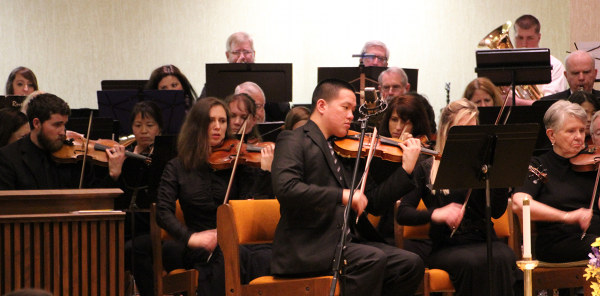
Violins form the front line in the March 2015 Oak Ridge Community Orchestra concert. (Photo by Nancy Cosgrove)
A free concert by the Oak Ridge Community Orchestra on Saturday, May 16, will feature Will Burkhart conducting the poetic “Prelude to the Afternoon of a Faun” by Claude Debussy, the strikingly descriptive “Moldau” by Bed┼Öich Smetana, the lyrical “Romanian Rhapsody No. 2” by Georges Enescu, and the turbulent “Tragic Overture” by Johannes Brahms.
“This is a great program to enjoy on a Saturday afternoon,” a press release said.
When “Prelude to the Afternoon of a Faun” by Claude Debussy (1862-1918) premiered in 1894, it was recognized as an historic change, launching the modern music style. In 1973, Bernstein commented that the piece stretches the limits of tonality, thus setting up the atonal works of the 20th century. In spite of its break with tradition, this is probably one of the most enjoyable compositions that you will ever listen to, a press release said.
Inspired by a poem, Debussy commented: ÔÇťThe music of this prelude is a very free illustration of Mallarm├ę’s beautiful poem. By no means does it claim to be a synthesis of it. Rather, there is a succession of scenes through which pass the desires and dreams of the faun in the heat of the afternoon. Then, tired of pursuing the timorous flight of nymphs and naiads, he succumbs to intoxicating sleep, in which he can finally realize his dreams of possession in universal Nature.ÔÇŁ
You can relax, and let the music guide your imagination in this poetic fantasy, the release said.
Between 1874 and 1880, Bed┼Öich Smetana (1824-1884) composed a series of six symphonic poems dedicated to the depiction of his homeland, Czechoslovakia. The suite was named “M├í Vlast,” meaning ÔÇťmy homeland.”
Probably the most popular piece from this series is “Vltava,” the Czech name for the Moldau River. It premiered on April 4, 1875.
As Smetana noted: ÔÇťThe composition describes the course of the Vltava, starting from the two small springs, the Cold and Warm Vltava, to the unification of both streams into a single current, the course of the Vltava through woods and meadows, through landscapes where a farmer’s wedding is celebrated, the round dance of the mermaids in the night’s moonshine: on the nearby rocks loom proud castles, palaces, and ruins aloft. The Vltava swirls into the St John’s Rapids; then it widens and flows toward Prague, past the Vy┼íehrad, and then majestically vanishes into the distance, ending at the Labe (or Elbe, in German).”
“If you listen carefully, the music will create each of those images in your mind,” the release said.
George Enescu (1881-1955) wrote two movements to his “Romanian Rhapsodies,” which premiered in 1903.┬á Both employ elements of the l─âut─âreasc─â music, endemic to Romania, with vivid rhythms and a feeling of spontaneity. Movement one features dances, while the second movement is slow and lyrical. ORCO will perform the second movement. It incorporates several traditional Romanian ballads: “On a Dark Rock, in an Old Castle,” the dance tune “S├«rba of the Fireman,” followed by the second half of the folksong, “Aiee, I’m Being Devoured by a Wolf!ÔÇŁ To wake up the audience and the orchestra, there is a brief section of fast animation, reviving the spirit of the lively l─âut─âreasc─â music, before the composition ends quietly.
Once you listen to the “Tragic Overture” by Johannes Brahms (1833-1897), you may decide the nickname is somewhat of a misnomer. Brahms chose this name to contrast the composition with the “Academic Overture,” which was written that same year (1880). Brahms felt that the “Tragic Overture” had a more turbulent character compared to the mirthful ebullience of its companion overture. This composition is all about evoking emotions via music.
To enjoy these compositions, join the concert on Saturday, May 16, at 2 p.m. in the sanctuary of the First Baptist Church of Oak Ridge, on the corner of the Oak Ridge Turnpike and LaFayette Drive. Admission is free. But modest donations at the door to support the orchestraÔÇÖs routine operating expenses will be appreciated.
The Oak Ridge Community Orchestra (ORCO) is a 501(c)3, nonprofit, volunteer organization, typically performing under the baton of Conductor and Music Director Gabriel Lefkowitz. Anyone wishing to regularly participate in the orchestra is encouraged to contact Personnel Manager Cyndi Jeffers at orcopersonnelmanager@gmail.com.
“Usually, we can accommodate additional string players, and occasionally there are openings in the brass, woodwind, and percussion sections,” the release said.
The orchestra welcomes experienced musicians of all ages. The Oak Ridge Community Orchestra is a rewarding venue for instrumentalists who enjoy playing for an appreciative audience, with music ranging from Baroque through Classical to Contemporary.
For more information about the ORCO, visit www.OakRidgeCommunityOrchestra.com.
Leave a Reply